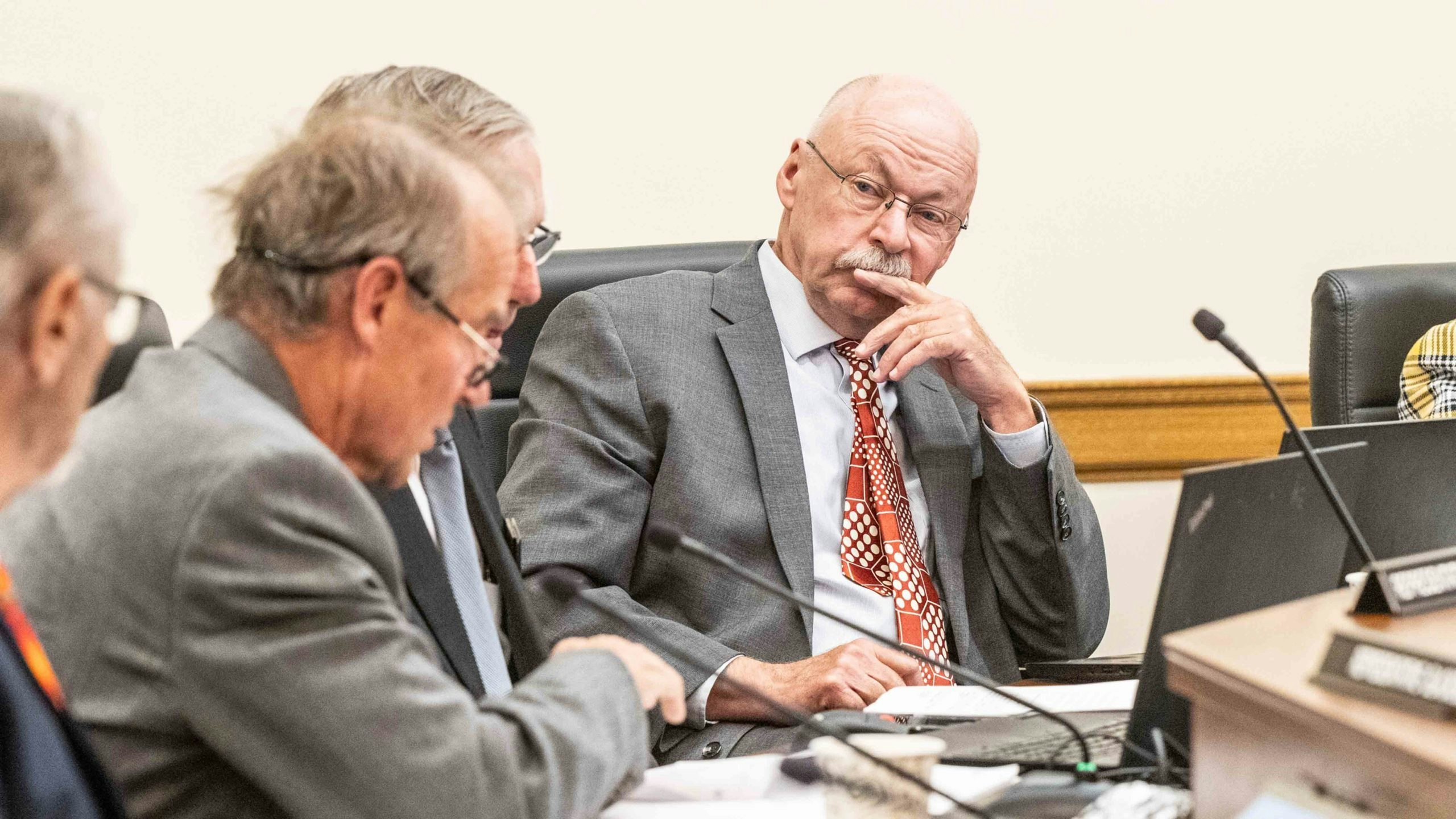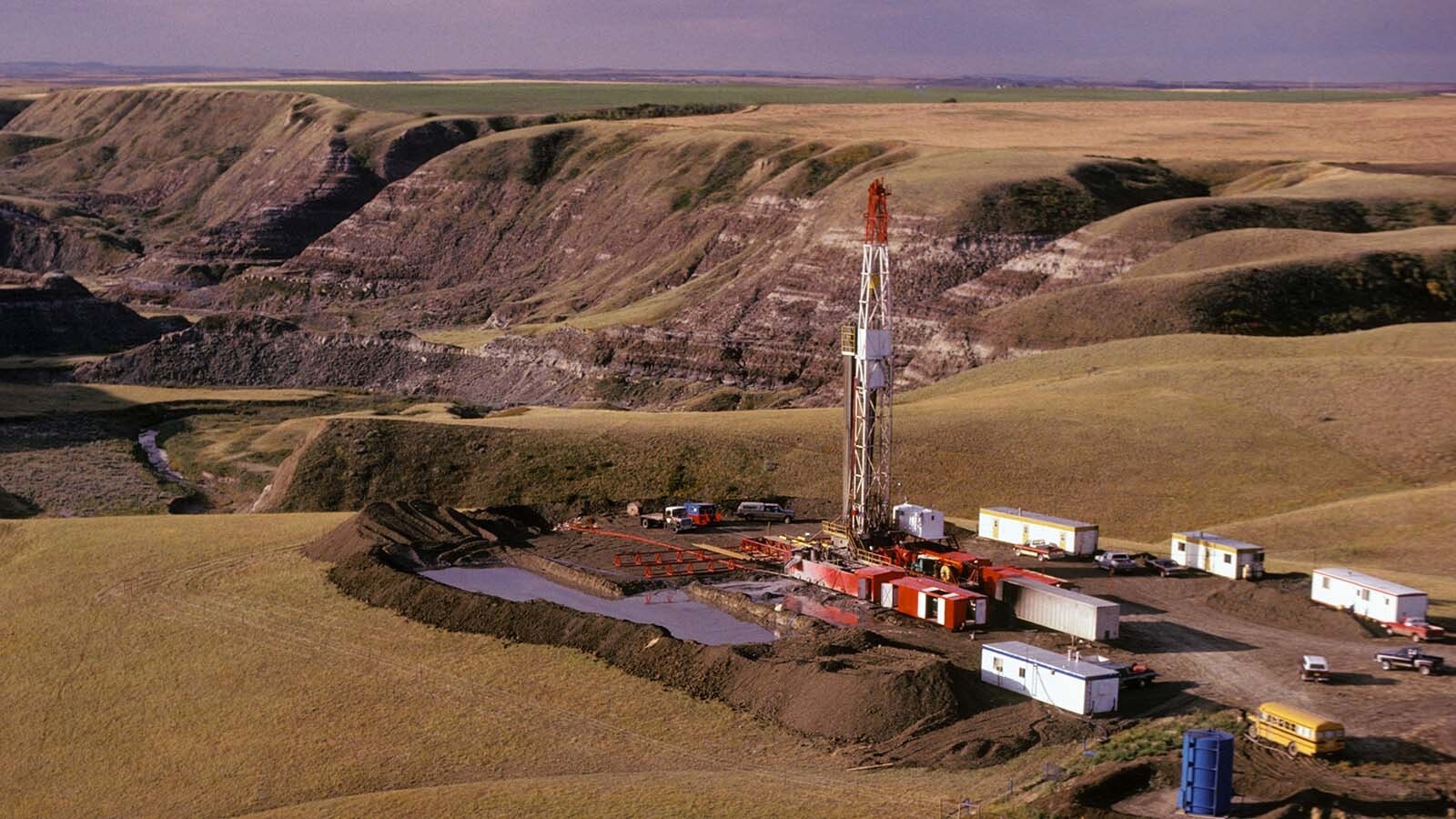By Leo Wolfson, State Political Reporter
Leo@Cowboystatedaily.com
The Wyoming Legislature has approved legislation that could give wind and solar companies a break on their taxes, but not without debate from some who say green energy already isn’t paying its way in the Cowboy State.
“Wyoming’s citizen taxpayers are begging the Revenue Committee to give relief and the Corporations Committee wants to give a tax break to wind and solar companies that do not live up to commitments for property tax revenues made when seeking a permit through Wyoming’s Industrial Sitting Council,” said state Sen. Cale Case, R-Lander, in opposition of the bill.
The Corporations, Elections and Political Subdivisions Committee approved draft legislation Thursday that would return assessment of independent power producers (IPP), defined as a private entity that owns facilities to generate electric power for sale to utilities and end users, to the Wyoming Department of Revenue.
There is a perception held by some county clerks and commissioners, and legislators like Case that the state has not been accurately assessing these industries.
Break From Protocol
A few years ago, the Wyoming Department of Revenue made an administrative decision that assessment of the IPP programs would switch to the county level.
“I really do not believe there is authority within the statute for the Department of Revenue to be valuing independent power producers,” said Brenda Henson, director of the state Department of Revenue.
Henson said the DOR took up assessing IPPs originally out of a perception that public utility companies would be running the facilities.
Brian Judkins, Department of Revenue Property Tax Division administrator, said his department and county assessors have the capability to assess IPPs. The DOR assesses regulated utility companies across the state, which IPPs had previously been considered.
“These aren’t utility companies, they very much aren’t,” Case said.
Case said wind and solar farms are more similar to refineries and other industrial operations taxed at the county level. There are, however, certain industrial operations taxed by the state, such as railroads, airlines and car rentals.
Industry Wants State Authority
Many wind and solar farms in Wyoming want the assessment of their taxes returned to the state.
“We would hope this bill would pass, but would also hope that the state would continue to issue a determination,” said Walter Eggers of the American Clean Power Association.
Eggers said IPPs should be state-assessed because their facilities are very similar to those used by other utilities. He requested the state resume assessment power for the upcoming tax year in 2023.
The bill returning this power to the state advanced with an 8-5 vote.
Outsourcing It
In September, assessors across Wyoming voted to outsource the valuations of property owned by IPPs to Texas engineering firm Thomas Y. Pickett, which will be charged with the valuation of these properties this upcoming tax year.
Converse County Assessor Dixie Huxtable and Dave Divis, Sweetwater County assessor and president of the Wyoming County Assessor’s Association, spoke in opposition of the bill. Divis mentioned a trona mine west of Green River as an example of a standard industrial facility assessed by T.Y. Pickett.
“It is an extremely complicated, heavy industrial facility that our appraisers have been working on for decades,” Divis said.
He drew a comparison to a new solar farm in Sweetwater County he said is much less complicated and county assessors are capable of appraising it.
What’s Fair?
Divis told Cowboy State Daily he wasn’t as surprised by the vote as he was by the number of lobbyists in the audience at the State Capitol on Thursday.
Divis said he isn’t sure if the independent power industry is paying its fair share of tax assessments. Information on how the state calculates its assessments is considered confidential.
A 2021 bill that would have allowed state assessors to share data on independent power producers with the counties did not pass. This past legislative session, two bills that would have returned assessment power back to the state also stalled out.
Perception vs. Reality
Divis said he was originally told by a local solar facility it would bring in $17 million in tax revenue over a 30-year period, representing the life of the project. Now, Divis has data from the state that suggests the total would be closer to $4 million.
“As assessors, we have concerns,” he said.
Huxtable said similar discrepancies occur with residential fee appeals.
“Do I think it’s prudent? Absolutely,” she said.
Local schools, fire and hospital districts, and other public agencies receive a significant amount of their funding through property tax assessments. Divis said all seven of the Wyoming counties with IPPs were already contracted with T.Y. Pickett for many industrial facilities in their counties, so adding the IPPs to these contracts resulted in only a “nominal” increase.
“Is the cost to the taxpayer to have all the assessors contracting with a private company worth what we’re already getting with the Department of Revenue that’s costing the taxpayer much much less?” asked state Rep. Dan Zwonitzer, chair of the Corporations, Elections and Political Subdivisions Committee.
Huxtable said T.Y. Pickett already assesses 70 other properties in her county, and the other six counties already had a contract with the company.
‘Window Dressing’
John Espy, a Carbon County commissioner, said the DOR rejected Carbon County’s offer to provide the state assessment numbers of its local independent power producers, which Espy said don’t align with state assessments.
The state provides county assessors their valuation numbers, but no explanation as to how it arrived at the numbers. Assessors have no power to challenge or adjust these numbers for final assessments.
Huxtable said she is prepared to assess the five independent power producers in her county in January and has already started performing work toward this effort.
Sen. Tara Nethercott, R-Cheyenne, brought up the proposal to allow county assessors the right to appeal state assessments.
Angela Pitale, a senior tax policy advisor with MultiState Associates, a lobbying firm, said Nextera Energy, a major wind and solar producer in Wyoming, would oppose it.
“If the assessors had the ability to appeal, the actual taxpayer would be left out of that process,” she said, adding the drafted bill goes further to give assessors rights than any other state with wind or solar.
Case described the amendment as “window dressing.”
Nethercott disagreed.
“I do think the counties are better off with that appraisal than they are not,” she said, adding they will have better power to discuss this information with taxpayers.
Pitale said Nextera is the sixth largest non-mineral property tax generator in Wyoming. Over the next 30 years, the company will pay $250 million in landowner payments and hundreds of millions worth of tax revenue in Wyoming from two projects alone.
“We need to enable a stable tax structure that is critical for enabling such investments,” Pitale said.
Pitale said wind farms may be treated differently county to county and discourage investments.
Apples To Apples?
Alan Minier, former chairman of the Wyoming Public Service Commission and State Board of Equalization, brought up the 26,000-acre Rail Tie Wind Farm project planned in Albany County.
The project is supposed to last 35 years, but by year 25 is scheduled to return to near-basis, leaving minimal assessment for the last 10 years of the project. Minier said a similar project under PacifiCorp, a major Wyoming energy producer, would not be allowed to forgo assessments for 10 years.
“If they were a regulated utility, they wouldn’t be estimating the depreciation of that basis,” he said.
Minier said this assessment method came from the DOR. County assessors are a more reliable source than the state because they have a larger number of staff at their disposal.
“The system is not working right at this point, by my estimation” he said. “There’s ways I could see it go wrong.”
Huxtable also said independent power plants retain the ability to appeal an assessment, a right she said is a positive feature that helps with transparency and accuracy. There has not been a single appeal filed by these producers in the last 10 years.
Pitale disagreed.
“As healthy as appeals are, they cost time, money, resources – all on the taxpayers’ dime,” Zwonitzer added.
Case disagreed, citing language precluding officials from disclosing information with the general public.
The amendment passed with a 6-5 vote.
“In the bigger picture, why are we doing this? Case asked. “What are we afraid of, and why are we trying to carry wind’s water at all costs in this committee?”





